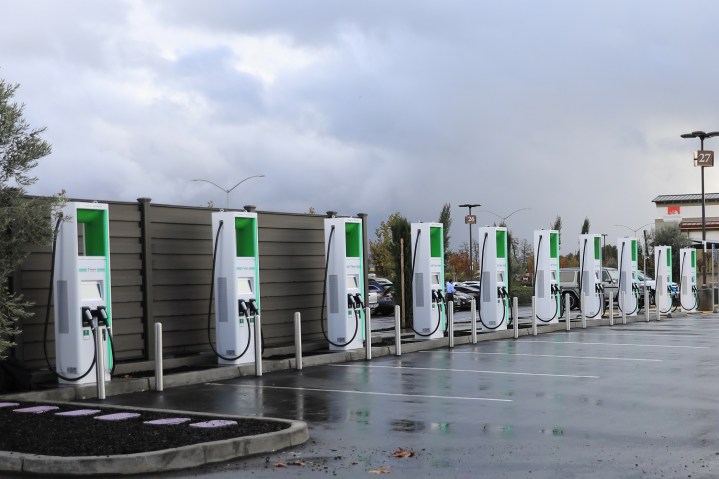
Volkswagen-funded Electrify America temporarily shut down its high-power electric car charging stations after uncovering a problem with a charging cable provided by a third-party company. Most of the high-kilowatt network remained offline during the three days it took the company to fix the problem, but electric car owners likely didn’t notice the disturbance.
“Extensive testing throughout the weekend and Monday showed that the cables have met all industry standards for use, and as a result, we are bringing our entire network back to full capacity,” wrote Electrify America CEO Giovanni Palazzo in a statement published online. Volkswagen founded the company he runs to create a nationwide, multi-million-dollar network of charging stations not unlike Tesla’s Supercharger network.
Electrify America blamed the problem on the liquid-cooled cables that electric car owners use to plug their vehicle into a charging station. The firm called the problem “a potential safety issue,” but it didn’t reveal the cause or the effect of the problem. It noted that only stations built to dispense 150 or 350 kilowatts were down; the slower, 50-kilowatt stations remained operational. The L2 chargers and the CHAdeMO connectors weren’t affected by the issue, either.
Huber+Suhner shed light on the matter shortly after Electrify America’s original announcement. It explained a cable used at a charging station in Germany short-circuited. No one was injured during the incident, and the cable was a first-generation prototype so problems weren’t inconceivable, but the company decided to ask customers to stop using its cables while it looked into the matter. It put the series-produced cable through extensive tests and found no problems, so everything is back to normal.
We doubt anyone noticed the stations were down: As of January 2019, none of the electric cars sold in the United States are compatible with 150- or 350-kilowatt charging. The first models able to take advantage of super-fast charging speeds will be the 2020 Audi E-Tron, which is scheduled to arrive in American showrooms in the summer of 2019, and the Porsche Taycan, which hasn’t been fully unveiled yet and won’t land until later in the year. To add context, Tesla throttles the output of its Supercharger stations when it approaches 120 kilowatts. In simple terms, the higher the kilowatts, the faster the charge.
Electrify America isn’t the only company that experienced problems with Huber+Suhner charging cables. The Verge reports Amsterdam-based Fastned shut down the 175-kilowatt chargers it operates in Holland and Germany after encountering cable-related problems.
Updated on January 30, 2019: Added information about Electrify America fixing the problem.



